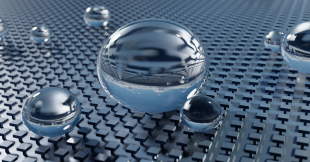The wetting behaviours of liquids on solid surfaces play an important role for a wide range of engineering applications, including coatings, electronics, oil recovery, microfluidics, and inkjet printing. For many of these applications, the key challenge is to control the static and dynamic wettability of a given substrate against various liquids. To achieve such control, especially over the full range of wettability landscape, surface chemistry, while crucial, is inadequate by itself. Recent works have shown that novel surfaces with exceptional wetting properties (often termed as superwettability) can be designed by introducing roughness, lubrication, chemical heterogeneities, and tuning the elasticity of the substrate.
The underlying theme of this PhD project is to study the rich interplay between fluid flow dynamics, surface chemistry, geometry, roughness, and solid elasticity in the context of wetting phenomena. Depending on the interests of the student, they can focus on modelling or combine modelling and experiments to develop engineering design principles for structured surfaces with superwettability properties. We will consider both model surfaces with regular patterns (e.g., posts, holes) and non-ideal, industrially relevant substrates (e.g., complex fibres, meshes). This project will also involve collaborations with our international experimental and industrial partners, Dr.-Ing. Hutomo Suryo Wasisto (Infineon Technologies AG, Germany) and Prof. Kuwat Triyana (Universitas Gadjah Mada, Indonesia), to explore how these design principles can be exploited for applications in microelectromechanical system (MEMS) and sensor technologies.
It is expected that the applicant will have a good degree in Engineering, Physics, Mathematics, or any other related subject. We are particularly keen to hear from applicants who want to develop expertise in fluids, surfaces, and/or simulations using high performance computing. Prior experience in any of these areas is useful but not a necessity to apply.
The student will join Prof Halim Kusumaatmaja’s group which will move to the Institute for Multiscale Thermofliuds at the University of Edinburgh in May 2024. The student will also benefit from a vibrant community of PhD students, postdoctoral research associates and academics working in various aspects of surfaces and wetting in Edinburgh.
Further Information:
The University of Edinburgh is committed to equality of opportunity for all its staff and students, and promotes a culture of inclusivity. Please see details here: https://www.ed.ac.uk/equality-diversity
Further information about Prof Halim Kusumaatmaja’s group can be found in: https://sites.google.com/site/kusumaatmaja/home
Closing Date:
Principal Supervisor:
Prof Halim Kusumaatmaja
Assistant Supervisor:
Eligibility:
Minimum entry qualification - an Honours degree at 2:1 or above (or International equivalent) in a relevant science or engineering discipline, possibly supported by an MSc Degree. Further information on English language requirements for EU/Overseas applicants.
Funding:
Applications are welcomed from self-funded students, or students who are applying for scholarships from the University of Edinburgh or elsewhere.



